职高英语基础模块上Unit1课件.ppt
合集下载
中职英语基础模块unit1省公开课金奖全国赛课一等奖微课获奖PPT课件

To be continued
19/44
Notes
(2) be good at后接名词或动名词, be good at sth表示“擅长什么事情”、 be good at doing sth“擅长做什么事情”。 比如: I am good at English. 我擅长英语。 They are good at playing football. 他们擅长踢足球。
4/44
I. Listen to the recording and tick the word you've just heard in each sentence.
Group 1 /ɔː/ and /aʊ/ Script
(1)My uncle has a horse. (2)They shout at each other.
To be continued
20/44
Notes
2. How about your pronunciation? 你语音(学得)怎样? how about…和what about…是英语口语中惯用两个省略句型 它们意思和使用方法基本相同,常惯用在以下场所。 (1) 向对方提出提议或请求。比如: How about going out for a walk? 出去散散步好吗? What about another cake? 再吃块蛋糕好吗? (2) 咨询对方看法或意见。比如: What about the TV play? 那个电视剧怎么样?
( ) 1. Ralph is good at English learning.
( ) 2. Pronunciation is Ralph’s big problem in
English
learning.
19/44
Notes
(2) be good at后接名词或动名词, be good at sth表示“擅长什么事情”、 be good at doing sth“擅长做什么事情”。 比如: I am good at English. 我擅长英语。 They are good at playing football. 他们擅长踢足球。
4/44
I. Listen to the recording and tick the word you've just heard in each sentence.
Group 1 /ɔː/ and /aʊ/ Script
(1)My uncle has a horse. (2)They shout at each other.
To be continued
20/44
Notes
2. How about your pronunciation? 你语音(学得)怎样? how about…和what about…是英语口语中惯用两个省略句型 它们意思和使用方法基本相同,常惯用在以下场所。 (1) 向对方提出提议或请求。比如: How about going out for a walk? 出去散散步好吗? What about another cake? 再吃块蛋糕好吗? (2) 咨询对方看法或意见。比如: What about the TV play? 那个电视剧怎么样?
( ) 1. Ralph is good at English learning.
( ) 2. Pronunciation is Ralph’s big problem in
English
learning.
中职英语基础模块1ppt课件
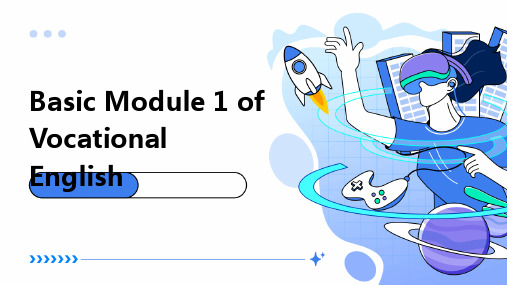
Social hierarchy
United Kingdom
Home to the English language, the United Kingdom is also known for its rich history, culture, and literature.
The United States is a global superpower with a diverse population and a thriving economy.
Listening Comprehension
The ability to understand the context of the spoken language, including cultural, social, and historical backgrounds, which helps in better comprehension of the information.
Canada is a multicultural country with a strong sense of national identity and a rich history.
Australia is known for its unique wildlife, beautiful landscapes, and a laid-back lifestyle.
Cross-cultural communication
03
To enhance students' ability to communicate effectively in English in a cross-cultural environment.
高教社中职英语基础模块1unit课件

03
Guidance and Practice of Listening Skills
01
Provide feedback on listening performance: After students complete the listening tasks, provide feedback on their performance, pointing out areas for improvement and highlighting good practices
01
02
03
04
Learning objectives and requirements
Basic vocabulary and expressions related to vocal topics
Common language structures and functions used in verbal English
01
02
Practice listening skills
Design listening activities that allow students to practice their listening skills, such as gap filling exercises, multiple choice questions, or true/false statements
Unit theme and background
Objectives
To develop basic English language proficiency in speaking, listening, reading, and writing
Guidance and Practice of Listening Skills
01
Provide feedback on listening performance: After students complete the listening tasks, provide feedback on their performance, pointing out areas for improvement and highlighting good practices
01
02
03
04
Learning objectives and requirements
Basic vocabulary and expressions related to vocal topics
Common language structures and functions used in verbal English
01
02
Practice listening skills
Design listening activities that allow students to practice their listening skills, such as gap filling exercises, multiple choice questions, or true/false statements
Unit theme and background
Objectives
To develop basic English language proficiency in speaking, listening, reading, and writing
UNIT1语文出版社 职业英语基础模块上PPT课件

B. 否定形式 There be no / not any + 主语 + 状语(介词短语)
C. 一般疑问句 Be + there + a/any + 主语 + 状语?
Is there a map on the wall? Yes, there is. / No, there isn’t.
1111/1/91/290/220 020
S+V+P
The book is on the desk. (prepositional phrase) B. 否定形式
Be 后面加not C. 一般疑问句形式(将be移至主语前)
Are you a new comer here?
Yes, i am./No, i am not.
1111/1/91/290/220 020
curtain
low bed
quilt
pillow
trunk
look! This is my bedroom. It is... There is/are "in/on". I love my bedroom.
16
Thank you Have a good day!
1111/1/91/290/220 020
7 please
请(请托语气,祈使句) Please come in. Two teas, please. Please don’t forget to take my book. 委婉的引起听者的注意,对不起;祈求
Please, Daddy, can i watch TV now? Can you do me a favor, please!
中职英语基础模块上册unit1PPT课件

Kissing hands
吻手礼:吻手礼源于古代维京人用手向其日耳曼君 主递礼物的风俗,流行于欧美上层社会,是一种仅对贵 族已婚妇女实施的礼节。吻手礼一般在室内举行,并且 仅限于手腕以下部位,一般是指背。
cross one's
hands 双手合十:
这种礼仪多见于 信奉佛教的国家,比如说泰国。 泰国人见面时往往低头问候, 并将双手合十于胸前。小辈见 长辈双手举到前额高度,平辈 到鼻子高度,而长辈还礼则只 需到胸前即可。另外,泰国认 为头部是神圣的,不能随意摸 别人的头。
你呢
I'm fine,too.Tha
nk you! 我也是,谢谢
LOREM IPSUM DOLOR
Nice to meet you! 很高兴见到你 Nice to meet you,too! 也很高兴见到你
• Notes:
•
• 1. Introductions are important because a proper introduction will leave a good first impression upon others.
bisous
贴面礼: 在阿拉伯国家,两个老朋友相见 不仅仅会握手和拥抱, 还会行贴面礼。行礼时,用右手 扶着对方的左肩,左手搂住对方 的腰, 左——右——左贴面三次。如果 两人关系亲密,还会在贴面的同 时发出亲吻的声音。
rub noses
碰鼻礼:新西兰的原住民 毛利人中还保留着一种古老 的见面礼仪,即碰鼻礼。毛 利主人在初次见面时必须与 客人鼻尖对鼻尖连碰两三次, 碰的次数越多、时间越长, 则说明客人 越受他们尊敬。
New words and expressions
❖welcome
语文版中职英语(基础模块 上册)Unit 1《Greetings》ppt课件1
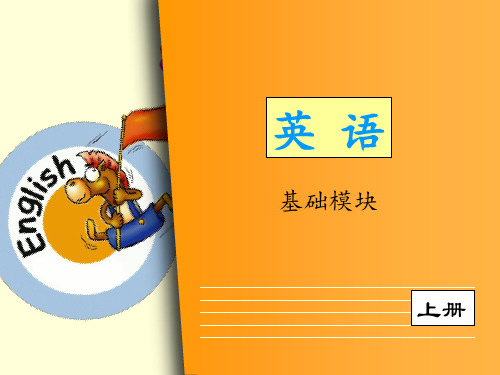
( ) 1. Hi, Jenny! ( ) 2. Good morning Jenny. Nice to meet you. ( ) 3. Hello, I’m Emily. ( ) 4. Bye. See you later. ( ) 5. How do you do? ( ) 6. Thank you!
Section C Reading
1 2 3
PreReading
WhileReading
PostReading
Pre-Reading
Work in groups to discuss the following questions.
1. When you meet someone for the first time, how do you usually greet him or her?
英 语
基础模块
上册
Unit 1 Greetings
Objectives
1.能够辨别/iː/和/ɪ/ , /e/和/ɪ/, /p/和/b/, /p/和 /f/在句子中的发音的不同, 并能正确掌握其发音。
2.掌握本单元出现的词汇、短语和句型,并能用一些 简单的短语、句型进行问候。 3.掌握名词、冠词、人称代词和物主代词的用法。
2. What ways of greeting in other countries do you know?
While-Reading
Greeting in Different Countries
Different countries have different races of people, different customs, and different manners. Each country has its own way of greeting people. In America, it is normal for men to shake hands when they meet but it is unusual for men to kiss when they greet each other. In England, people often do no more than saying “hello” when they see friends. The British usually shake hands only when they meet for the first time. In Japan, it is polite and normal for men and women to bow when they greet someone. In Tibet of China, it is very polite for people to stick their tongues out at someone. It shows they have no evil thoughts.
Section C Reading
1 2 3
PreReading
WhileReading
PostReading
Pre-Reading
Work in groups to discuss the following questions.
1. When you meet someone for the first time, how do you usually greet him or her?
英 语
基础模块
上册
Unit 1 Greetings
Objectives
1.能够辨别/iː/和/ɪ/ , /e/和/ɪ/, /p/和/b/, /p/和 /f/在句子中的发音的不同, 并能正确掌握其发音。
2.掌握本单元出现的词汇、短语和句型,并能用一些 简单的短语、句型进行问候。 3.掌握名词、冠词、人称代词和物主代词的用法。
2. What ways of greeting in other countries do you know?
While-Reading
Greeting in Different Countries
Different countries have different races of people, different customs, and different manners. Each country has its own way of greeting people. In America, it is normal for men to shake hands when they meet but it is unusual for men to kiss when they greet each other. In England, people often do no more than saying “hello” when they see friends. The British usually shake hands only when they meet for the first time. In Japan, it is polite and normal for men and women to bow when they greet someone. In Tibet of China, it is very polite for people to stick their tongues out at someone. It shows they have no evil thoughts.
中职英语基础模块unit1 PPT

Grammar Focus
1、Are you a new student? Yes,I am . 2、They are my classmates 3、She is not a teacher 4、There are no books in our bedroom now 5、I ama boy.My name is Mike 6、Are there any students over there? 7、This is my brother,Dick 8、There is a reading-room and many classrooms in our school
1、Let sb do sth 让某人做某事 2、how large it is! 多么大啊! 感叹句对形容词或副词感叹时要用how并置于句首。
例如:How tall the building is! How beautiful the flowers!
welcome to our school
.
2、See you next time! 分手时希望下次再见面,常用的口语语句
例如:See you later. 一会儿见 See you. 再见 See you tomorrow. 明天见
Reading Comprehension
• 1. Li Lei is a new student of the school. • 2. There are sixty classrooms , eighteen labs and
Unit1
Greetings
hello! 你好
Hello ! 你好
Good morning!早上好 Good morning!早上好
常
常
语文版中职英语(基础模块-上册)Unit-1《Greetings》ppt课件

语文版中职英语(基础模块-上册)Unit-1 《Greetings》ppt课件
welcome v.
欢迎
welcome to… vocational
欢迎到……来 职业的
glad adj.
高兴的
be glad to do…
很高兴做……
meet v.
遇见;汇合;迎接
look
v.看;瞧 & link v.看起来,显得
thank v. thank…for… visit v. time n. English want v. desk n. chair n.
感谢 为……而感谢…… 参观
时间;次数 adj. 英国的;英语的 n.英语
想要
书桌;办公桌 椅子
Learn the important phrases
• welcome to…
look at… 看;
class n.
班级;课节
a lot of …
许多……
read v.
读;阅读
study v.
学习
after prep & conj.在……之后
after class课后来自see v.看见
let v.
让
every adj.
每一;每个
love v.
热爱;爱好
hard adv. & adj. adv.努力地 & adj.硬 的;难的
1Are am are is
6 Are 7 is 8 is
4 are 5 am is
2 am is am is are is are is is is is is is are is are
Listening :
This is our teacher
welcome v.
欢迎
welcome to… vocational
欢迎到……来 职业的
glad adj.
高兴的
be glad to do…
很高兴做……
meet v.
遇见;汇合;迎接
look
v.看;瞧 & link v.看起来,显得
thank v. thank…for… visit v. time n. English want v. desk n. chair n.
感谢 为……而感谢…… 参观
时间;次数 adj. 英国的;英语的 n.英语
想要
书桌;办公桌 椅子
Learn the important phrases
• welcome to…
look at… 看;
class n.
班级;课节
a lot of …
许多……
read v.
读;阅读
study v.
学习
after prep & conj.在……之后
after class课后来自see v.看见
let v.
让
every adj.
每一;每个
love v.
热爱;爱好
hard adv. & adj. adv.努力地 & adj.硬 的;难的
1Are am are is
6 Are 7 is 8 is
4 are 5 am is
2 am is am is are is are is is is is is is are is are
Listening :
This is our teacher
高教版中职英语基础模块一 Unit1 Reading and Writing 精美课件

Read and write.
再读家庭简介,进一步描述两个家庭的特点。
Anna Sห้องสมุดไป่ตู้ith’s Family Individual
Yuchen’s family pay more attention to _i_n_d_i_v_i_d_u_a_ls_.____ For example, they __d_o_n_’_t _li_v_e__to_g__et_h_e_r_w__i_th__g_r_a_n_d_m__a_.__ P__a_r_e_n_t_s_g__o_j_o_g__g_i_n_g__e_v_e_r_y__e_v_e_n__in__g_._T__h_e_y__d_o_n__’t__s_ta_y__w__i_th t_h_e__c_h_i_l_d_r_e_n_.__________________________________________
_S_t_u_d_e_n_t_s_m__u_st__p_r_ep__a_re__f_o_r_c_o_ll_e_g_e_e_n_t_r_a_n_c_e_e_x_a_m__in_a_t_i_o_n_.
Anna Smith’s Family
I live with my mom, my dad, my twin sister Emma and Buddy — my puppy.
2) Children watch TV with grandparents on the weekend. 与…玩耍
3) Children play with their little dog after school.
在周末
4) Father buys a birthday gift for grandmother.
中职英语高教版基础模块1第1单元《Personal—Understanding》课件
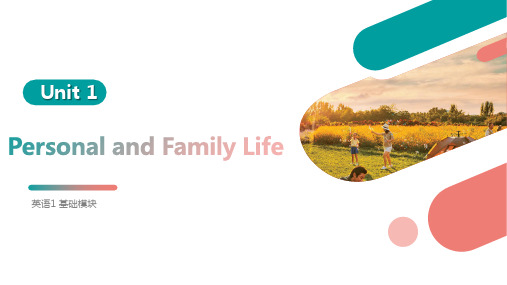
Unit 1
英语1 基础模块
05
Culture Understanding
Culture Understanding
1、Warming up 2、Culture Understanding 3、Group discussion 4、Homework
Words and Expressions
community /kəˈmjuːnəti/ n. 社区 cook /kʊk/ v. 烹饪 energetic /ˌenəˈdʒetɪk/ adj. 精力充沛的 especially /ɪˈspeʃəli/ adv. 尤其是 family /ˈfæməli/ n. 家庭 gift /ɡɪft/ n. 礼物 handmade /ˌhændˈmeɪd/ adj. 手工制作的 introduce /ˌɪntrəˈdjuːs/ v. 介绍 jog /dʒɒɡ/ v. 慢跑 manager /ˈmænɪdʒə (r)/ n. 经理 notice /ˈnəʊtɪs/ v. 注意到 parent /ˈpeərənt/ n. 母亲或父亲
same in English and in Chinese. We can address people
相同的
称呼
by their full names. For example, Yuan Longping and
部分) of Chinese people put family name before given
name. Family names are so important to us because
重要的Байду номын сангаас
告诉
they tell who our ancestors (祖先) are and where we
英语1 基础模块
05
Culture Understanding
Culture Understanding
1、Warming up 2、Culture Understanding 3、Group discussion 4、Homework
Words and Expressions
community /kəˈmjuːnəti/ n. 社区 cook /kʊk/ v. 烹饪 energetic /ˌenəˈdʒetɪk/ adj. 精力充沛的 especially /ɪˈspeʃəli/ adv. 尤其是 family /ˈfæməli/ n. 家庭 gift /ɡɪft/ n. 礼物 handmade /ˌhændˈmeɪd/ adj. 手工制作的 introduce /ˌɪntrəˈdjuːs/ v. 介绍 jog /dʒɒɡ/ v. 慢跑 manager /ˈmænɪdʒə (r)/ n. 经理 notice /ˈnəʊtɪs/ v. 注意到 parent /ˈpeərənt/ n. 母亲或父亲
same in English and in Chinese. We can address people
相同的
称呼
by their full names. For example, Yuan Longping and
部分) of Chinese people put family name before given
name. Family names are so important to us because
重要的Байду номын сангаас
告诉
they tell who our ancestors (祖先) are and where we
职高英语基础模块上Unit1精ppt课件

in 2008. 3. This afternoon we’re going to __v_is_it___ (参观) a
friend in hospital. 4. The boys are going to play b_a_s_k_e_tb_a_l_l (篮球) in the
afternoon. 5. My brother looks _h_a_n_d_s_o_m_e_ (英俊的) and healthy.
C. are
D. has
8.There are ____ books in the bag.
A. no
B. not C. no any D. any
.
1. Our school _l_ib_r_a_ry_ (图书馆) is in a new building. 2. She graduated from a _v_o_ca_t_io_n_a_l_ (职业的) school
building classroom∕u∕ floor library
reading room playground basketball blackboard chair
bedroom
v.建造 build n.实验室 lab n.班级 class n.宿舍 dormitory n.餐厅 dining-hall n.途径 way n.足球 football n.书桌 desk n.座位 seat n.男人 man
.
You are my sunshine, my only sunshine. 你就是我的阳光,我唯一的阳光 You make me happy when skies are gray. 当天空乌云密布时是你使我快乐 You'll never know dear, how much I love you. 亲爱的,你从未明了,我是多么的爱你 Please don't take my sunshine away. 请别带走我的阳光
friend in hospital. 4. The boys are going to play b_a_s_k_e_tb_a_l_l (篮球) in the
afternoon. 5. My brother looks _h_a_n_d_s_o_m_e_ (英俊的) and healthy.
C. are
D. has
8.There are ____ books in the bag.
A. no
B. not C. no any D. any
.
1. Our school _l_ib_r_a_ry_ (图书馆) is in a new building. 2. She graduated from a _v_o_ca_t_io_n_a_l_ (职业的) school
building classroom∕u∕ floor library
reading room playground basketball blackboard chair
bedroom
v.建造 build n.实验室 lab n.班级 class n.宿舍 dormitory n.餐厅 dining-hall n.途径 way n.足球 football n.书桌 desk n.座位 seat n.男人 man
.
You are my sunshine, my only sunshine. 你就是我的阳光,我唯一的阳光 You make me happy when skies are gray. 当天空乌云密布时是你使我快乐 You'll never know dear, how much I love you. 亲爱的,你从未明了,我是多么的爱你 Please don't take my sunshine away. 请别带走我的阳光
高教版职高英语1(基础模块)Unit1PPT课件
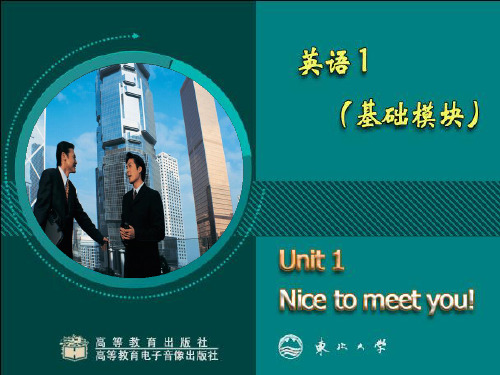
• (很好/好/挺好的/棒极了/太好了/好得不得了/一般。)
• — Not bad. / The same as always. / I can’t complain.
• (还过得去/和以前一样/没什么可抱怨的/还过得去。)
• — Terrible. / Not good. I’ve had a headache all morning.
Dialogue A
Nice to meet you!
1
Activity 4
2
Activity 5
3
Activity 6
Activity 4
Listen and underline. 听录音,标出在活动3中用过的语句。
Mary:
Hi! I’m Mary.
Li Xiaonian: Hi, Mary! I’m Li Xiaonian.
• (难受极了。我整个早上都头痛。)
• 4. Jane: How’s it going?
•
Zhang Xiaobin: Fine. / Pretty good.
• 5. Jane: How’s everything with you?
• Zhang Xiaobin : So far so good.
Mary:
Nice to meet you.
Li Xiaonian: Nice to meet you, too.
(针对Dialogue A) (可用作dialogue A的补充对话, 同样用于学生见面寒暄,难 度稍大,可给程度好的学生补充)
• 1. Jane: Nice to meet you, I am Jane.
• Jane: Sure!
• 2. Jane: Good morning, Xiaobin. How are you today?
职业中学基础模块UNIT_1_Hello__everyone!不可多得的课件
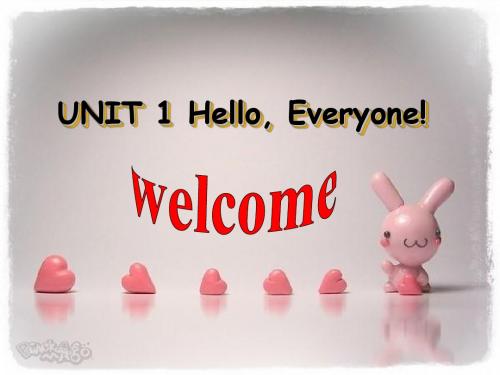
call hope southern part province graduate enjoy
I hope
You can
we can be good friends.
call me Miss Chen. is in the southern part
Guangzhou province of China. I graduated enjoys
given name/first name family name/last name
Mrs. Beckham
He’s John Smith
Mr. Smith Dr. Smith
Useful sentences in greeting:
• Hello./Hi.
• Good morning./Good afternoon. /Good evening.
UNIT 1 Hello, Everyone!
Title Mr. /'mistə /
Miss /mis/ Mrs. /'misiz/
Used for Single and married men 未婚或已婚男士 Single women 未婚女士
Married women 已婚女士 Single and married women 未婚或已婚女士 婚姻状况不明的女士 doctors 医生
Hi, I’m Billy. You’re a new student, aren’t you? Yes, I am. My name is Sandy. And this is my sister. Hello! My name is Billy. What’s your name? Nice to meet you. I’m Sue. Sorry, could you say your name again? It’s Sue. S-u-e Sue. Sue. Got it.
中等职业学校英语教材(基础模块)ppt课件

13
4.Read the fourth passage
Cola 可乐
Instant noodles
14
bubble gum
milk tea roast mutton cubes
potato chips
KFC
15
discuss All these things are “junk food”, is it good for people’s health?
1. __In__t_h_e_n_o_r_t_h___ of China, the most _p_o_p__u_la_r__ food is dumpling.
2. The family getting together is __im__p_o_r_t_a_n_t__ during the Spring Festival.
fish hot dogs dumplings
pizza fish and chips
Ex2. what’s the main idea of this passage?
People in different countries have different favorite food.
10
2.Read the second and the third passages and then fill in the blanks
2
Revision
tell us the English words according to the Chinese
1.饺子 2.北方 3.餐馆
4.健康 5.菜单 6.饥饿的
7.重要的
8.不同的
dumpling north restaurant
4.Read the fourth passage
Cola 可乐
Instant noodles
14
bubble gum
milk tea roast mutton cubes
potato chips
KFC
15
discuss All these things are “junk food”, is it good for people’s health?
1. __In__t_h_e_n_o_r_t_h___ of China, the most _p_o_p__u_la_r__ food is dumpling.
2. The family getting together is __im__p_o_r_t_a_n_t__ during the Spring Festival.
fish hot dogs dumplings
pizza fish and chips
Ex2. what’s the main idea of this passage?
People in different countries have different favorite food.
10
2.Read the second and the third passages and then fill in the blanks
2
Revision
tell us the English words according to the Chinese
1.饺子 2.北方 3.餐馆
4.健康 5.菜单 6.饥饿的
7.重要的
8.不同的
dumpling north restaurant
高教社中职英语基础模块1unit课件

情境活动:设计各种情境活 动,让学生在活动中学习和
运用知识
情境评价:通过情境评价, 了解学生的学习情况和效果
任务驱动
任务驱动教学法: 以任务为驱动, 引导学生主动学 习
任务设计:设计 具有挑战性和趣 味性的任务,激 发学生的学习兴 趣
任务实施:引导 学生完成任务, 提高学生的实践 能力和创新能力
任务评价:对学 生完成任务的过 程和结果进行评 价,促进学生自 我反思和自我提 升
感谢您的观看
汇报人:
教师评价与反馈
评价标准:根据学生的学习表现、 作业完成情况、课堂参与度等方面 进行评价
反馈方式:及时向学生反馈评价结 果,指出优点和不足,提出改进建 议
添加标题
添加标题
添加标题
添加标题
评价方式:采用多种评价方式,如 教师评价、学生自评、同伴互评等
反馈内容:包括学习态度、学习方 法、学习效果等方面的反馈,帮助 学生了解自己的学习情况,提高学 习效果。
教学演示:教师示范讲解,帮助学 生掌握技能
添加标题
添加标题
添加标题
添加标题
教学动画:生动有趣的动画,帮助 学生理解知识点
教学案例:真实案例,帮助学生理 解知识点在实际中的应用
拓展资源
教材配套网站:提 供在线学习资源和 教学辅助工具
网络课程:提供在 线课程和视频教程, 方便学生自主学习
教学软件:提供英 语学习软件,如单 词记忆、听力训练 等
适用人群
中等职业学校学生
英语基础薄弱的学生
希望提高英语水平的学生
英语教师和教学研究人员
课件特点
内容丰富:涵盖中 职英语基础模块1 的所有知识点
形式多样:包括视 频、音频、图片、 文字等多种形式
高教版中职英语基础模块一 Unit1 文化理解和小组活动精美课件

Underline important information about Lu Xun’s three different names in this information board.
在以下简介牌中标出有关鲁迅先生三个不同名字的重要信息。
Lu Xun (鲁迅) was born in September, 1881. His grandfather named him Zhou Zhangshou (周樟寿), which means longevity (长寿). In April, 1898, he became a student in Jiangnan Naval Academy (江南水师学堂). His grandfather’s brother, Zhou Jiaosheng (周椒生), named him Zhou Shuren (周树人). The given name means educating the young. In May, 1918, he published A Madman’s Diary (《狂人日记》) under the now famous pen name Lu Xun. It is said that he chose Lu Xun because Lu is his mother’s family name and Xun means being fast.
Review
live with sb/sth
和某人或某物住在一起
love sb/sth very much 非常爱某人/某物
live in + 地点
居住在某地
be strict with sb
对某人严格
cook /make lunch
高教社中职英语基础模块1Unit ppt课件

友来访时加以选择。
ppt课件
3
Lead-in
1
Activity 1
2
Activity 2
ppt课件
4
Activity 1
Read and tick. 读下列单词,选出与餐厅相关的词。
( ) food
( ) menu
( ) juice
( ) ball
( ) teacher
( ) book
( ) chicken
ppt课件
11
Activity 5
Read and underline. 阅读对话,用下画线标出描述餐厅的语句。 Tang Hua: Hi, Sara. Do you want to eat out?
Sara: Yes. Do you like Chinese food or Western food? Tang Hua: I’d like some Western food.
Dialogue B
Would you like to
order?
1
Activity 7
2
Activity 8
3
Activity 9
4
Activity 10
5
Activity 11
6
Activity 12
ppt课件
17
Activity 7
Look and tick. 看图,选出服务员要说的话。
1) The waiter might say: ( ) a. Hello! Nice to see you! ( ) b. Welcome to Meiwei Restaurant!
ppt课件
19
Activity 9
ppt课件
3
Lead-in
1
Activity 1
2
Activity 2
ppt课件
4
Activity 1
Read and tick. 读下列单词,选出与餐厅相关的词。
( ) food
( ) menu
( ) juice
( ) ball
( ) teacher
( ) book
( ) chicken
ppt课件
11
Activity 5
Read and underline. 阅读对话,用下画线标出描述餐厅的语句。 Tang Hua: Hi, Sara. Do you want to eat out?
Sara: Yes. Do you like Chinese food or Western food? Tang Hua: I’d like some Western food.
Dialogue B
Would you like to
order?
1
Activity 7
2
Activity 8
3
Activity 9
4
Activity 10
5
Activity 11
6
Activity 12
ppt课件
17
Activity 7
Look and tick. 看图,选出服务员要说的话。
1) The waiter might say: ( ) a. Hello! Nice to see you! ( ) b. Welcome to Meiwei Restaurant!
ppt课件
19
Activity 9
高教版中职英语基础模块一 Unit1 Language Practice精美课件
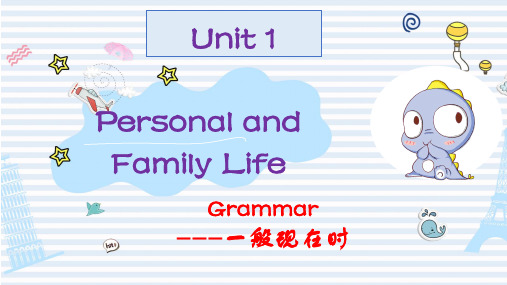
Unit 1
Personal and Family Life
Grammar ---一般现在时
Learning Objectives:
Knowledge objectives To master the basic usage of simple present. Ability objectives To be able to use simple present accurately.
Emotional objectives To cultivate the good learning habit and improve the language ability.
一般现在时
概念
I often eat apples. 我经常吃苹果。
Mike plays basketball every day. Mike 每天打篮球。
练习
2. My father often ______ to work by bus.
A. go B. goes C. went D. is doing
一般现在时 实义动词句式结构
1. 肯定句: 主语 + 实义动词 (do/does) + 其他.
Eg: I play basketball every day. He plays basketball every day.
New Message
Subject: I have a new friend!
Read and choose.
1. I _____ a piano lesson every Sunday afternoon.
A. had B. will have C. has D. have
2. The two boys _____ from Luzhou.
Personal and Family Life
Grammar ---一般现在时
Learning Objectives:
Knowledge objectives To master the basic usage of simple present. Ability objectives To be able to use simple present accurately.
Emotional objectives To cultivate the good learning habit and improve the language ability.
一般现在时
概念
I often eat apples. 我经常吃苹果。
Mike plays basketball every day. Mike 每天打篮球。
练习
2. My father often ______ to work by bus.
A. go B. goes C. went D. is doing
一般现在时 实义动词句式结构
1. 肯定句: 主语 + 实义动词 (do/does) + 其他.
Eg: I play basketball every day. He plays basketball every day.
New Message
Subject: I have a new friend!
Read and choose.
1. I _____ a piano lesson every Sunday afternoon.
A. had B. will have C. has D. have
2. The two boys _____ from Luzhou.
职高英语基础模块上Unit1课件
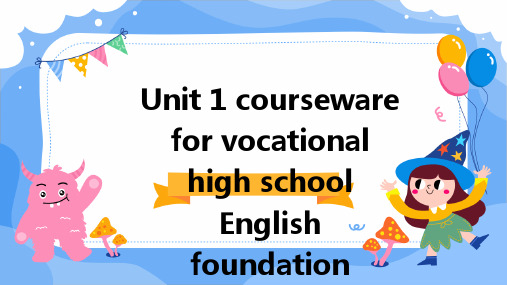
Listening exercises and answer analysis
Exercises should be designed to test students' comprehension of the listening materials rather than their ability to repeat words or phrases.
Students should be taught how to understand different speaking rates and volumes, as well as the use of pauses, emphasis, and intonation.
Students should be taught how to identify different types of English language registers, such as formal and informal language.
• Giving advice and suggestions: This topic helps students learn to give advice and suggestions on various topics, such as healthy living, travel, and study skills. They also learn to use modal verbs, such as "should" and "could," appropriately.
Analysis of Reading Skills
识别并分析文章结构
引导学生识别文章的主题句、段落大 意和整体结构,帮助学生理解文章的 主旨和逻辑关系。
- 1、下载文档前请自行甄别文档内容的完整性,平台不提供额外的编辑、内容补充、找答案等附加服务。
- 2、"仅部分预览"的文档,不可在线预览部分如存在完整性等问题,可反馈申请退款(可完整预览的文档不适用该条件!)。
- 3、如文档侵犯您的权益,请联系客服反馈,我们会尽快为您处理(人工客服工作时间:9:00-18:30)。
_T_h_e_re__is__a_te_a_c_h_e_r_a_n_d__tw__o_s_tu_d_e_n_t_s_i_n_t_h_e_c_la_s_s_r_o_o_m_._ 教室里有一位老师和两名学生。
_T_h_e_re__a_re__tw__o_s_t_u_d_e_n_ts_a_n_d__a_t_e_ac_h_e_r_i_n_t_h_e_c_l_a_ss_r_o_o_m_. 教室里有两位学生和一名老师。
6. Thank sb for sth/doing sth “为……而感谢某人”
如: __T_h__a_n_k_y__o_u_f_o_r__y_o_u_r_h__e_lp_.
谢谢你的帮助。 7.There be+名词+某地 “某处有……” 如果句中主语有两个以上的名词,be的单复数形式
由靠近be的名词保持一致,即就近原则。如:
1. Hello, John! Welcome __B___ Shijiazhuang!
A. at B. to
C. in
D. /
2. I’ll be glad __A__ with you.
A. to go B. going C. go
D. gone
3. My house is __D__ the fifth floor.
n.时间
time
adv.稍Байду номын сангаас later
adj.职业的 vocational adj.高兴的 glad/happy
adj.大的 large
adj.明亮的 bright
adj. 好的 adj.伟大的 adj.年轻的
nice great young
adj.下次的 next adj. 潇洒的 handsome adj. 每一 every
3. a lot of=lots of +可数名词或不可数名词 “很多,大量的”。如:
_Y_o_u__ca_n_s_e_e_a_l_o_t _of_c_a_r_s _in__th_e_s_tr_e_et_._ 在街上,你能见到许多汽车。 4. next to “紧挨着”。如:
__T_h_e_te_a_c_h_er_’s__ro_o_m__is_n_e_x_t _to__ou_r_c_l_as_s_ro_o_m_._ 教师办公室紧挨着我们的教室。
building classroom∕u∕ floor library
reading room playground basketball blackboard chair
bedroom
v.建造 build n.实验室 lab n.班级 class n.宿舍 dormitory n.餐厅 dining-hall n.途径 way n.足球 football n.书桌 desk n.座位 seat n.男人 man
adv.努力地; adj.硬的;难的 hard
教学楼
classroom building
课后
after class
Reading
1.Welcome to… “欢迎到……来”。如: _W__el_co_m_e__to_B_e_ij_in_g_! ____ 欢迎到北京来。
2. be glad to do sth “很高兴做某事”如: ___I’_m__gl_a_d_to__se_e_y_o_u_.__ 我很高兴见到你。
如: _H_o_w__c_l_e_v_er__a_g_i_rl_s_h_e_i_s_!_ 她是多聪明的孩子! 注意:what 与how引导的感叹句可以转换。 如: What a beautiful garden it is! →
_H__o_w__b_e_au_t_i_fu_l_t_h_e_g_a_r_d_e_n_i_s!_ 多漂亮的花园啊!
A. in B. at
C. into D. on
4. There are _C___ students on the playground.
A. a lot B. a lots of C. a lot of D. lot of
5. _____ beautiful garden it is!
A. What B. How C. What a D. How a
6. Our classroom building is ____ the dinninghall.
A. next to B. next on C. at
D. to
7. There ____ a dinning room and two bedrooms in my house.
A. be
B. is
③What +adj +不可数名词+(主语+谓语)! 如: __W__ha_t_c_o_ld__w_e_at_h_er_i_t_is_!__ 多冷的天!
㈡How 引导的感叹句 ①How +adj/adv +主语 +谓语!
如: _H_o_w__lo_v_e_l_y_t_h_e_b_a_b_y__is_! 小宝贝真可爱! ②How+adj +a/an+可数名词单数+主语 +谓语!
New Words and Expressions
v.欢迎 welcome
v.看;瞧 look
v.学习 study
v.让
let
v.热爱 love
v.&n.参观 visit
v.遇见 meet v.读 read v.看见 see v.玩 play v.感谢 thank v.想要 want
n.建筑物 n.教室 n.楼层 n.图书馆 n.阅览室 n.操场 n.篮球 n.黑板 n.椅子 n.卧室
C. are
D. has
8.There are ____ books in the bag.
A. no
B. not C. no any D. any
1. Our school _l_ib_r_a_ry_ (图书馆) is in a new building. 2. She graduated from a _v_o_ca_t_io_n_a_l_ (职业的) school
5. 感叹句 ㈠ What 引导的感叹句 ①What +a/an + adj+单数名词+(主语+谓语)!
如: __W__ha_t_a_c_l_ev_e_r_b_o_y_h_e_i_s!_ 他是多聪明的孩子!
②What +adj+可数名词复数+(主语+谓语)! 如: __W_h_a_t _w_o_n_d_er_f_ul_i_d_e_as_(_w_e_h_a_v_e_)!_ 我们的主意真棒!
_T_h_e_re__a_re__tw__o_s_t_u_d_e_n_ts_a_n_d__a_t_e_ac_h_e_r_i_n_t_h_e_c_l_a_ss_r_o_o_m_. 教室里有两位学生和一名老师。
6. Thank sb for sth/doing sth “为……而感谢某人”
如: __T_h__a_n_k_y__o_u_f_o_r__y_o_u_r_h__e_lp_.
谢谢你的帮助。 7.There be+名词+某地 “某处有……” 如果句中主语有两个以上的名词,be的单复数形式
由靠近be的名词保持一致,即就近原则。如:
1. Hello, John! Welcome __B___ Shijiazhuang!
A. at B. to
C. in
D. /
2. I’ll be glad __A__ with you.
A. to go B. going C. go
D. gone
3. My house is __D__ the fifth floor.
n.时间
time
adv.稍Байду номын сангаас later
adj.职业的 vocational adj.高兴的 glad/happy
adj.大的 large
adj.明亮的 bright
adj. 好的 adj.伟大的 adj.年轻的
nice great young
adj.下次的 next adj. 潇洒的 handsome adj. 每一 every
3. a lot of=lots of +可数名词或不可数名词 “很多,大量的”。如:
_Y_o_u__ca_n_s_e_e_a_l_o_t _of_c_a_r_s _in__th_e_s_tr_e_et_._ 在街上,你能见到许多汽车。 4. next to “紧挨着”。如:
__T_h_e_te_a_c_h_er_’s__ro_o_m__is_n_e_x_t _to__ou_r_c_l_as_s_ro_o_m_._ 教师办公室紧挨着我们的教室。
building classroom∕u∕ floor library
reading room playground basketball blackboard chair
bedroom
v.建造 build n.实验室 lab n.班级 class n.宿舍 dormitory n.餐厅 dining-hall n.途径 way n.足球 football n.书桌 desk n.座位 seat n.男人 man
adv.努力地; adj.硬的;难的 hard
教学楼
classroom building
课后
after class
Reading
1.Welcome to… “欢迎到……来”。如: _W__el_co_m_e__to_B_e_ij_in_g_! ____ 欢迎到北京来。
2. be glad to do sth “很高兴做某事”如: ___I’_m__gl_a_d_to__se_e_y_o_u_.__ 我很高兴见到你。
如: _H_o_w__c_l_e_v_er__a_g_i_rl_s_h_e_i_s_!_ 她是多聪明的孩子! 注意:what 与how引导的感叹句可以转换。 如: What a beautiful garden it is! →
_H__o_w__b_e_au_t_i_fu_l_t_h_e_g_a_r_d_e_n_i_s!_ 多漂亮的花园啊!
A. in B. at
C. into D. on
4. There are _C___ students on the playground.
A. a lot B. a lots of C. a lot of D. lot of
5. _____ beautiful garden it is!
A. What B. How C. What a D. How a
6. Our classroom building is ____ the dinninghall.
A. next to B. next on C. at
D. to
7. There ____ a dinning room and two bedrooms in my house.
A. be
B. is
③What +adj +不可数名词+(主语+谓语)! 如: __W__ha_t_c_o_ld__w_e_at_h_er_i_t_is_!__ 多冷的天!
㈡How 引导的感叹句 ①How +adj/adv +主语 +谓语!
如: _H_o_w__lo_v_e_l_y_t_h_e_b_a_b_y__is_! 小宝贝真可爱! ②How+adj +a/an+可数名词单数+主语 +谓语!
New Words and Expressions
v.欢迎 welcome
v.看;瞧 look
v.学习 study
v.让
let
v.热爱 love
v.&n.参观 visit
v.遇见 meet v.读 read v.看见 see v.玩 play v.感谢 thank v.想要 want
n.建筑物 n.教室 n.楼层 n.图书馆 n.阅览室 n.操场 n.篮球 n.黑板 n.椅子 n.卧室
C. are
D. has
8.There are ____ books in the bag.
A. no
B. not C. no any D. any
1. Our school _l_ib_r_a_ry_ (图书馆) is in a new building. 2. She graduated from a _v_o_ca_t_io_n_a_l_ (职业的) school
5. 感叹句 ㈠ What 引导的感叹句 ①What +a/an + adj+单数名词+(主语+谓语)!
如: __W__ha_t_a_c_l_ev_e_r_b_o_y_h_e_i_s!_ 他是多聪明的孩子!
②What +adj+可数名词复数+(主语+谓语)! 如: __W_h_a_t _w_o_n_d_er_f_ul_i_d_e_as_(_w_e_h_a_v_e_)!_ 我们的主意真棒!
